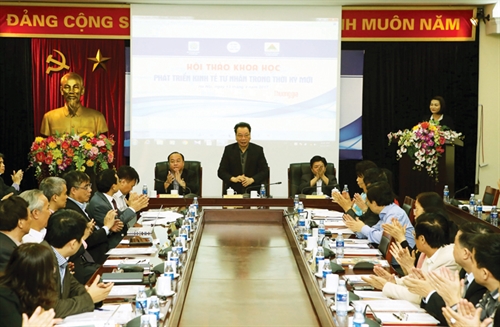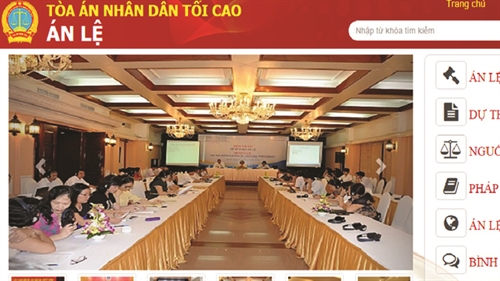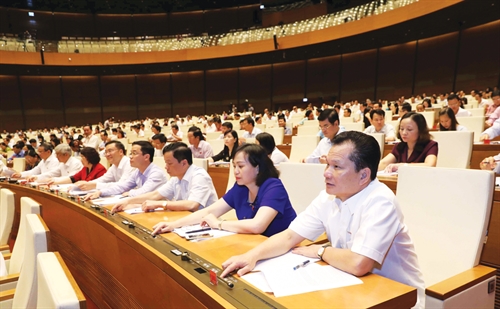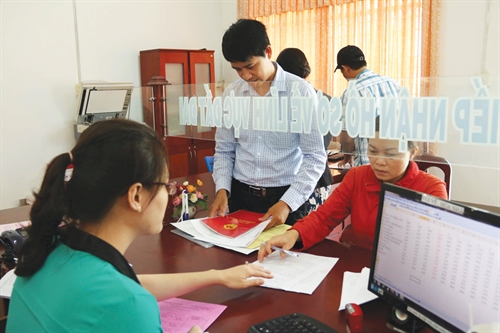The National Assembly (NA) Committee on Financial and Budgetary Affairs should reach agreement with the Ministry of Finance (MOF) on the sole focal point in public debt management, said NA Chairwoman Nguyen Thi Kim Ngan at the 13th session of the NA Standing Committee (NASC) that closed on August 18.
She made the request after hearing debates on the revised draft Law on Public Debt Management, asking for compliance with international practices and Politburo Resolution 07-NQ/TW of 2016 concerning policies and solutions to restructure the state budget and manage public debts.
Ngan said the Government’s proposal not to change the existing focal points in public debt management in order to avoid disorder in the organization of these agencies was unconvincing as it would be incompliant with the policy on state administrative reform.
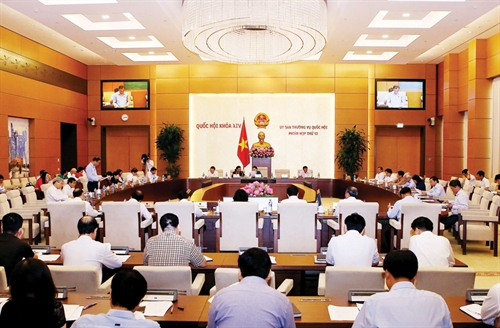 |
| A plenary meeting of the 13th session of the National Assembly Standing Committee held on August 15 in Hanoi__Photo: Nguyen Dan/VNA |
Earlier, the NA Committee on Financial and Budgetary Affairs suggested the Government perform the unified management of public debts and revise regulations on the functions and tasks of related ministries and sectors. Accordingly, MOF would negotiate and conclude framework agreements and specific agreements while the Ministry of Planning and Investment assist the Government in uniformly managing public investment and propose loan demands for public investment in the total funding sources for development investment. Meanwhile, the State Bank of Vietnam would act as the country’s representative at international financial and monetary institutions and coordinate with MOF in negotiating and concluding loan agreements and managing foreign exchange under relevant laws.
As explained by the Committee, that many focal points are in charge of public debt management as at present is the reason for the current non-centralization and loose coordination in such management, thus causing difficulties to the determination of the responsibilities to borrow loans and repay debts and the assessment of loan use efficiency.
Meanwhile, discussions on the revised draft Law on National Defense focused on the current law’s provisions on announcement and abolishment of the state of war and curfew and the use of land for national defense purpose.
Deputy Minister of National Defense Phan Van Giang said the current law helps boost the fight against crime and ensure social order and safety but it does not yet cover many new policies of the Party and new provisions of the 2013 Constitution concerning national defense.
Moreover, Giang added, the implementation of the 2005 Law on National Defense revealed many inadequacies and was found to be incongruous with the requirements and tasks of national defense activities in the current situation.
NA Vice Chairman Do Ba Ty said the NASC basically agreed with the need for a revised law on national defense with the aim to further enforce the 2013 Constitution and institutionalize the resolutions of the Party.
Reporting on the revised draft Law on Denunciations, the Government asked for retention of two forms of denunciation, namely filing written denunciations and directly making denunciations. It did not support the proposal to permit other forms of denunciation such as denunciation via telephone, fax and email, expounding that such might cause difficulties to state bodies in the settlement of denunciations and determination of responsibilities of persons who abuse the right to denounce in order to smear others’ honor and dignity.
However, Chairman of the NA Law Committee Nguyen Khac Dinh said denunciations which are identified as grounded and bear full names and addresses of denouncers would be accepted for settlement. He noted that making denunciations via telephone, fax or email is in essence another way of expressing the above two forms of denunciation, so the law should prescribe that forms of denunciation include filing written denunciations and lodging denunciations in other law-prescribed forms which may include making denunciations via telephone, fax and email.
Regarding protection of whistleblowers, the Government has re-designed the draft’s Chapter VI with provisions on the order, procedures and measures for protection of denouncers and their relatives as well as providers of information in the process of denunciation settlement.
Nevertheless, according to the NA Law Committee, the draft’s provisions on the issue were infeasible and unsuitable to socio-economic conditions of the country. It asked for review of such provisions in order to avoid overlaps with the provisions of the civil, penal and administrative laws.
Majority of NASC members held that subjects of application of the law should include neither persons who no longer work as cadres or civil servants, retirees nor those who shifted to other jobs. They said these persons should be subject to the revised draft law on civil servants and public employees.
NA Vice Chairman Uong Chu Luu asked the law-drafting body to coordinate with the law-verifying body and related agencies in assimilating opinions of NA deputies so that the revised draft law on denunciations is satisfactory when being submitted to the NA.
Talking about the draft Law on Public Administration, head of the drafting committee Tran Thi Quoc Khanh said the draft aims to concretize the principles of the 2013 Constitution regarding state administrative management and public service provision with a view to building an administrative system where people can inspect, supervise and assess public administrative activities to create positive changes in the state-citizen relationship.
Assessing the draft, Nguyen Khac Dinh said it is the first draft law initiated by an individual in the history of Vietnamese NA, noting that the NA Law Committee appreciated Khanh’s efforts but held that the draft’s contents remained too general and some of them were impractical and infeasible.
The draft also failed to set out policies, conditions and criteria for an effective public administrative system, Dinh said, noting that the draft needs consideration in order to avoid overlaps with other regulations.
In conclusion, Luu said the NASC asked the law-drafting committee to study setting the draft to regulate the issues of the administrative system which are not yet governed by other laws and revise its provisions to be more practical and feasible.
At this week-long session, the NASC also debated the draft Law on Protection of State Secrets, and draft revisions to the laws on forest protection and development, fisheries, overseas representative missions of the Socialist Republic of Vietnam, and criminal records.
The next NASC session is planned to be held on September 11-18.- (VLLF)
